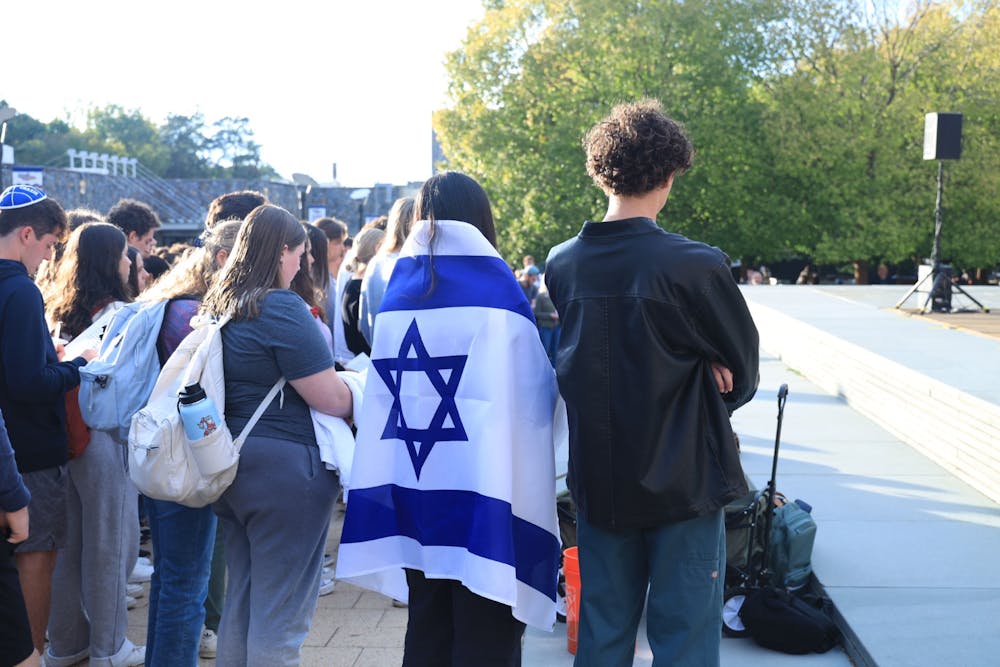Duke community members held a vigil on the Bryan Center plaza Monday evening to mourn the lives lost after Hamas militants launched a deadly surprise attack on Israel Saturday.
Jewish and Israeli professors, students and religious figures shared speeches with over 150 attendees, honoring victims and inspiring a strong sense of community.
Director for Jewish Life Joyce Gordon began by acknowledging the lives lost and the lives still at risk.
As of Monday evening, the death toll has risen to around 900 people in Israel, according to an Israeli embassy spokesperson, and Hamas has taken an estimated 150 Israeli hostages. The Gaza health ministry states that over 680 Palestinians have been killed in retaliatory strikes.
“Every one of these people has a family. Every one of these people is deeply loved. And everyone should be with us here today. Some of us know them personally. Some of us are one or two people removed,” Gordon said before initiating a moment of silence.
Gordon recited a poem from Yehuda Halevi, a 12th century Jewish physician, poet and philosopher, “Tis a Fearful Thing.”
Shai Ginsburg, associate professor of Asian and Middle Eastern studies, also turned to poetry to help put his feelings into words, reciting a 1928 poem titled “Final Prayer.”
“As I stand here together with you, I vacillate between pain, hurt, anger, frustration and despair,” Ginsburg said with words of his own. “I stand here, lamenting not only for those hundreds upon hundreds who viciously lost their lives over the past three days, but also for the lives who are sure to be lost in the coming days. It is a horrific vision of agony and death.”
Rabbi Nossen Fellig spoke to this sense of hopelessness and despair.
“I think the biggest emotion that's been going around from talking with students is the feeling of paralyzed, helpless, powerless. What can we possibly do here thousands of miles away from Israel? How can we just go about with our day?” Fellig asked.
The answer, according to Ginsburg and Fellig, is to find hope through community, prayer and the perseverance of Jews throughout history.
“Even if at this moment all looks bleak, in bringing together, we are forming a bond, a community, that can strive to make a difference in the world we live in — to make the world we live in different precisely from the heart of greed. … As we arrived with agony, we should embrace each other and brace each other, for better and for worse, together,” Ginsburg said.
“It's no secret that the survival of our nation of the Jewish people is not by chance. … Whether it was Hitler, whether it was Pharaoh, whether it was Khmelnytsky, whether it was Haman, they're all gone. They're all part of history,” Fellig said.
“The Jewish people, we’re still here. We are still alive. We're still strong in 2023. It's not by chance. We have a divine blessing. … Our prayers have power,” Fellig said, before reciting a psalm in Hebrew.
Two Duke students, sophomores Eva Spektorov and Noyah Shebshaievitz, shared their thoughts as well.
Spektorov moved to Israel from Ukraine when she was 13 years old, and gave a tearful testimony surrounding her family and friends still in Israel.
“I keep refreshing the missing persons Instagram to check if anyone that I know has been kidnapped. I call my cousins every five minutes just to hear their voices. I close my eyes, and all I can see are images of teenagers and toddlers running for their lives. I've been using the word ‘I’ — replace it with ‘We,’” Spektorov said. “We're one body that's being bombarded. And we feel every single hit. Every one of us, when we're laughing, and we're sitting in class and asking questions, we're dying inside. We don't know how to deal with the terror of what's going on in our homeland.”
Shebshaievitz then said a prayer for the state of Israel, almost entirely in Hebrew.
More prayers in Hebrew followed, with Rabbi Elana Friedman, Jewish Chaplain for Jewish Life at Duke, reciting Oseh Shalom and the Mourner’s Kaddish, as many members of the crowd sang along in unison.
“In the Mishnah, we are told that whoever kills one person has destroyed the whole world. Tonight, our hearts and our world is broken. We mourn for this tragic loss, this life loss for Israel, for our families, for our friends and for our community. And in times of uncertainty, and in times of stress and pain and sorrow, we turn to prayer to guide us and comfort us,” Friedman said.
“Jewish wisdom tells us that mourning should not be quick. It should not be rushed or denied. … Allow yourself to grieve and to mourn. Know that this community — look around you for a moment, how many people are here — this community is here for you. Know that we are strong,” Friedman continued.
Gordon ended the vigil by inviting everyone to exit in silence in order to respect the "solemn nature of the moment" and the holiness of the space created.
Get The Chronicle straight to your inbox
Signup for our weekly newsletter. Cancel at any time.

Madeleine Berger is a Trinity senior and an editor at large of The Chronicle's 119th volume.

